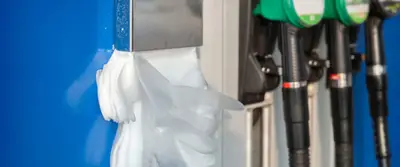NACS: Cleaning High-Touch Surfaces at the Pump
Help debunk the myth that gas pumps spread COVID-19 by being upfront about your cleaning and sanitizing practices.
ALEXANDRIA, Va. March 24, 2020; Inside the store, convenience retailers are doing their part to minimize COVID-19 risk by cleaning and sanitizing high-touch surfaces, and the same practices should be applied to the fuel island.
Companies like CAF are providing retailers with guidance for cleaning and sanitizing high-touch areas at the pump, including nozzles, keypads and buttons, touchscreens and monitors, and squeegee handles. CAF is providing a downloadable and printable “Outdoor Surface Cleaning and Disinfecting” poster, as well as a downloadable and printable “Hourly Cleaning Checklist” to help retailers keep track of when employees clean and sanitize high-touch areas throughout the day.
“As an extra measure of safety, we recommend avoiding the use of bleach and bleach-based products,” notes CAF on its COVID-19 resource page. “When bleach comes into contact with organic and inorganic materials, it begins breaking down colors and materials. Additionally, when it comes into contact with other cleaners, even in small amounts, it can create a chemical reaction resulting in deadly, noxious fumes. Not only is it dangerous (requiring gloves, masks and eye protection during use), it’s also extremely bad for the environment and can impact local fish and wildlife.”
As convenience retailers continue to share with customers the frequency of their cleaning and sanitizing practices, concerns about the fueling island are circulating media reports and social sites. The homepage of Snopes.com examines a claim that COVID-19 is being spread through gas pumps, noting that nozzle handles “could be contaminated, so consumers should take reasonable precautions to avoid exposure.”
However, the Snopes.com debunks a claim that gas pumps are responsible for giving people the coronavirus, noting that gas pumps “are only one of many commonly-handled objects that could transmit the COVID-19 coronavirus, and we have found no substantiated reports of anyone’s having been infected in that fashion yet.”
While surface contact is one means of transmission of the novel coronavirus, and since gas pumps are objects that are typically handled by many different people throughout the course of a day, “they are a potential route for the virus to spread from person to person,” the Snopes.com team says.
The risk, however, if difficult to determine considering other day-to-day activities and touchpoints, as well as handwashing frequency. Consumer Reports offers advice for consumers who may be concerned about touching high-contact areas at the gas pump, such as using “disposable nitrile or latex gloves” or use paper towels “that are sometimes available at the pump” to grip the handle.
“Cleaning your hands after you’re done seems like the quickest, easiest precaution. But some drivers might want to have disinfectant wipes handy for wiping down the gas pump handle and the payment keypad before pumping,” writes Consumer Reports.
John Eichberger, executive director of the Fuels Institute, shared with Consumer Reports that convenience stores and gas stations are doing what they can to combat the spread of COVID-19 by cleaning and sanitizing their facilities regularly and sharing with their customers how often they are sanitizing down high touch-point areas.
“If consumers are really worried about touching a gas pump handle, they can do what they do when they go to a grocery store and wipe down surfaces with disinfectant wipes when they need to touch something,” Eichberger said.
Eike Steinmann, a virologist at Ruhr-Universitat Bochum in Germany, told Consumer Reports that although it’s not entirely clear how long coronavirus lives once attached to a surface, it’s likely no more than a few days. And given that bacteria and viruses exist everywhere in the natural environment, the best defense is frequent, vigorous handwashing, per Stephen Thomas, M.D., chief of infectious diseases and director of global health at Upstate Medical University in Syracuse, New York.
Dr. Thomas told the news source that coronaviruses are surrounded by a protective envelope that helps them attach to and infect other cells, and that the friction from scrubbing is enough to break down the virus’s coating.
Mike G. Zahajko, executive vice president of sales at CAF, told NACS Daily that as important as it is to clean and disinfect high-touch point areas to slow the spread of COVID-19, he believes that it’s equally important for customers to see employees in action:
“When customers drive up and actively see you wiping down surfaces and disinfecting high-touch areas around your sites, it gives them a sense of reassurance,” he said, adding that retailers can show they care about the safety and well-being of their employees and customers by cleaning and disinfecting their locations.
Be on the lookout for information about an upcoming webinar with the Fuels Institute, NACS and CAF on cleaning and sanitizing the fuel island and inside the store.
Coronavirus Resources
NACS has compiled resources to help the convenience retail community navigate the COVID-19 crisis. For news updates and guidance, visit NACS Coronavirus-Resources resources page.



